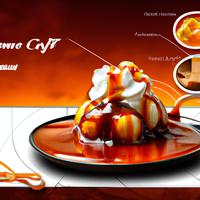
1 serving (20 grams) contains 60 calories, 0.0 grams of protein, 0.0 grams of fat, and 15.0 grams of carbohydrates.

Log this food in SnapCalorie

Nutrition Information
Calories |
714.3 | ||
|---|---|---|---|
% Daily Value* |
|||
| Total Fat | 0 g | 0% | |
| Saturated Fat | 0 g | 0% | |
| Polyunsaturated Fat | 0 g | ||
| Cholesterol | 0 mg | 0% | |
| Sodium | 59.5 mg | 2% | |
| Total Carbohydrates | 178.6 g | 64% | |
| Dietary Fiber | 0 g | 0% | |
| Sugars | 166.7 g | ||
| protein | 0 g | 0% | |
| Vitamin D | 0 mcg | 0% | |
| Calcium | 0 mg | 0% | |
| Iron | 0 mg | 0% | |
| Potassium | 119.0 mg | 2% | |
* Percent Daily Values are based on a 2,000 calorie diet. Your daily values may be higher or lower depending on your calorie needs.
Food Attributes
Source of Calories
About Caramelsiroop
Caramelsiroop, or caramel syrup, is a sweet, amber-colored liquid made by heating sugar until it caramelizes, often combined with water to achieve a pourable consistency. Some versions may include butter, cream, or flavorings for a richer taste. Predominantly used in European cuisines, caramelsiroop is popular in desserts, beverages, and breakfast dishes like pancakes or waffles. Its origins draw from traditional confectionery practices, making it a staple in both home cooking and professional patisserie. While caramelsiroop delights with its indulgent flavor, it is primarily composed of sugar, giving it a high caloric content with minimal nutritional benefits. Excessive consumption can contribute to weight gain and negatively impact dental health. Healthier homemade versions can limit added sugars and avoid artificial additives. Though not a health food, when enjoyed in moderation, caramelsiroop can be a flavorful treat suited for occasional indulgence.



